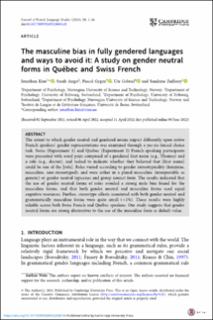| dc.contributor.author | Kim, Jonathan | |
| dc.contributor.author | Angst, Sarah | |
| dc.contributor.author | Gygax, Pascal | |
| dc.contributor.author | Gabriel, Ute | |
| dc.contributor.author | Zufferey, Sandrine | |
| dc.date.accessioned | 2023-04-14T06:53:56Z | |
| dc.date.available | 2023-04-14T06:53:56Z | |
| dc.date.created | 2022-06-08T10:19:58Z | |
| dc.date.issued | 2022 | |
| dc.identifier.citation | Journal of French Language Studies. 2022, . | en_US |
| dc.identifier.issn | 0959-2695 | |
| dc.identifier.uri | https://hdl.handle.net/11250/3062980 | |
| dc.description.abstract | The extent to which gender neutral and gendered nouns impact differently upon native French speakers’ gender representations was examined through a yes-no forced choice task. Swiss (Experiment 1) and Québec (Experiment 2) French-speaking participants were presented with word pairs composed of a gendered first name (e.g., Thomas) and a role (e.g., doctor), and tasked to indicate whether they believed that [first name] could be one of the [role]. Roles varied according to gender stereotypicality (feminine, masculine, non-stereotyped), and were either in a plural masculine (interpretable as generic) or gender neutral (epicenes and group nouns) form. The results indicated that the use of gender neutral forms of roles avoided a strong male bias found for the masculine forms, and that both gender neutral and masculine forms used equal cognitive resources. Further, stereotype effects associated with both gender-neutral and grammatically masculine forms were quite small (<1%). These results were highly reliable across both Swiss French and Québec speakers. Our study suggests that gender neutral forms are strong alternatives to the use of the masculine form as default value. | en_US |
| dc.language.iso | eng | en_US |
| dc.publisher | Cambridge University Press | en_US |
| dc.rights | Navngivelse 4.0 Internasjonal | * |
| dc.rights.uri | http://creativecommons.org/licenses/by/4.0/deed.no | * |
| dc.title | The masculine bias in fully gendered languages and ways to avoid it: A study on gender neutral forms in Québec and Swiss French | en_US |
| dc.title.alternative | The masculine bias in fully gendered languages and ways to avoid it: A study on gender neutral forms in Québec and Swiss French | en_US |
| dc.type | Journal article | en_US |
| dc.type | Peer reviewed | en_US |
| dc.description.version | publishedVersion | en_US |
| dc.source.volume | 33 | en_US |
| dc.source.journal | Journal of French Language Studies | en_US |
| dc.source.issue | 1 | en_US |
| dc.identifier.doi | 10.1017/S095926952200014X | |
| dc.identifier.cristin | 2030136 | |
| cristin.ispublished | true | |
| cristin.fulltext | original | |
| cristin.qualitycode | 2 | |

